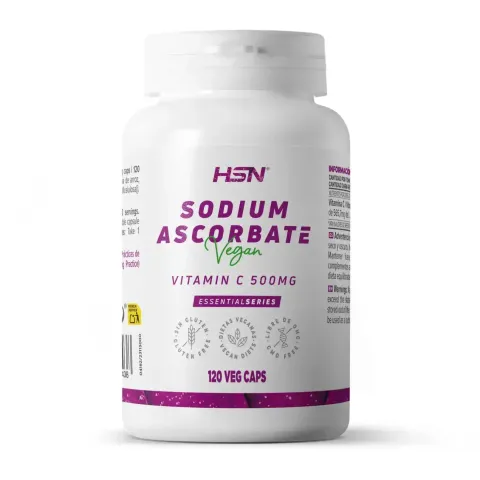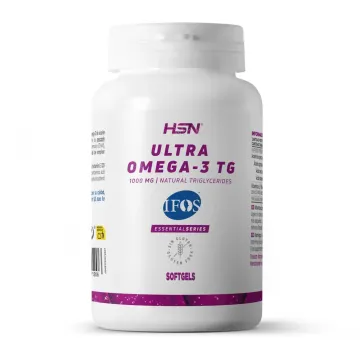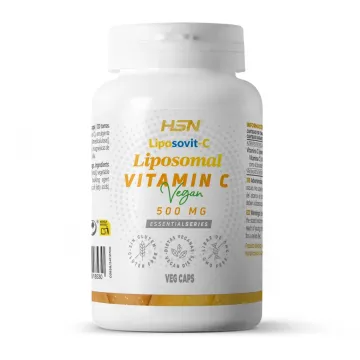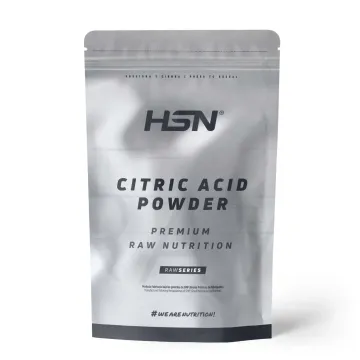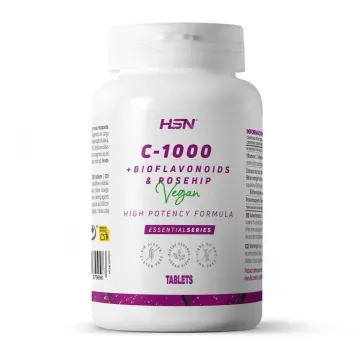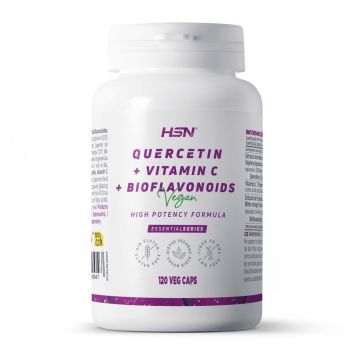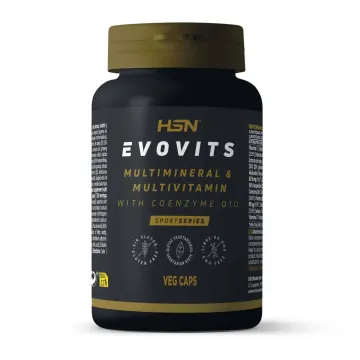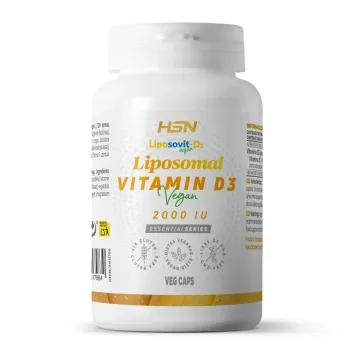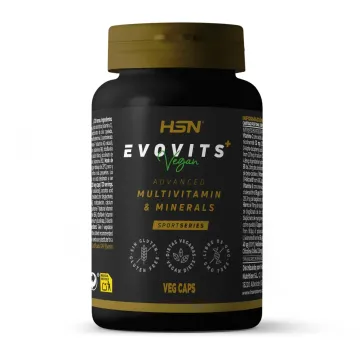- Buffered form of ascorbic acid (vitamin C), as an ionic salt with sodium.
- Excellent nutritional combination to provide a source of high bioavailability vitamin C.
- pH above 7. Non-acidic vitamin C, unlike ascorbic acid.
- Does not harm the enamel or dentin. The neutral pH helps to prevent acidic effects.
- 500mg of pure vitamin C per vegetable capsule (556.7mg of sodium ascorbate) | Complete and transparent information.
- Dietary supplement 100% suitable for vegetarian and vegan diets.
Sodium Ascorbate - New form of Vitamin C
Sodium Ascorbate (500mg Vitamin C) from EssentialSeries is a dietary supplement developed in vegetable capsules from the sodium salt of ascorbate as a form of vitamin C that offers nutritional interest to users seeking to avoid the traditional form of acid.
Ascorbic acid, which is vitamin C itself, differs from sodium ascorbate in that one of the hydrogens in its chemical structure is replaced by sodium. This causes it to lose its 'acid' status by regulating the pH to much more basic values, without losing any effects or benefits.
Sodium L-ascorbate is an alternative presentation to classic ascorbic acid, with equivalent effectiveness.
Sodium Ascorbate by HSN - High purity and concentration
500mg of vitamin C per capsule - Transparent information
Sodium ascorbate is not 100% vitamin C, as the part of it that contains sodium is not vitamin, obviously.
The base content of vitamin C in the form of sodium L-ascorbate is 88%, which is very high, almost the entirety of the sodium ascorbate content is vitamin C, but not all.
Why is this important?
Because there are companies that are not entirely transparent in the way they refer to the content of their products, and they might indicate '500mg' on their packaging, like we do, but instead of being 500mg of vitamin C itself, not sodium ascorbate which is more; they pass off the content of sodium ascorbate as 100% vitamin C.
Considering the contribution of 88% base vitamin C, these products that refer to '500mg' but are of sodium ascorbate and not of vitamin C itself are making you believe that you are using almost 60mg more of vitamin C than you are actually consuming, since it contributes around 440mg.
At HSN we are always transparent with our information, and we aim to provide as much as possible so that all users can make informed purchases with full knowledge of what they are buying and what they will consume when they do; we seek to add value through quality, information, and responsible commitment to our customers, who place their trust in us, and therefore we reject the 'makeup' of information since for us it is a form of concealment and deceit.
Our 'Sodium Ascorbate' is not '500mg', it is '500mg of base vitamin C'.
Developed as Clean label: Free of additives
Additives, although they have been demonized among consumers of food products and dietary supplements, the truth is that in many cases they are inevitable and play a critical function in maintaining the product in good condition.
Just as this is so, there are many additives that are not so necessary, for example, colorants, are exclusively aesthetic additives in most cases; and those additives can be avoided.
And there are compounds with which the use of additives is not so necessary, not all compounds need the same types or amounts of additives, some are well preserved without the need for additives. For this to make sense, a precise study of the physicochemical behavior of the product after its first opening is necessary, but if the R&D department of a dietary supplement company is committed to quality, how could they not do it?
That's what we've done at HSN!
Our sodium ascorbate is clean label, which means that the use of additives in its composition is restricted to the minimum, to the point where our own product does not contain them, we only use HPMC as a manufacturing agent for the capsule, which is a vegetable polymer that has good resistance to contain the powder inside, and rice flour to fill the rest of the capsule after adding the 566.7mg of sodium ascorbate in each unit.
Easy right? The best for you and yours is at HSN!
Raw material with guaranteed purity - The best way to provide vitamin C
The purity of the compounds that are provided as a dietary supplement is important, for a matter of absence of contaminants and other mixed compounds and efficiency, since a less pure ascorbate powder requires more quantity to achieve the same nutritional contribution.
The sodium ascorbate from HSN is practically 100% pure raw material, which guarantees its maximum quality and nutritional availability.
Suitable for vegan diets - Sodium ascorbate is a vegetable vitamin
Vitamin C is an essential nutrient, and as such, its dietary supplementation should be suitable for all types of people, right? Including populations with food allergies, and those who do not consume animal-derived foods.
However, many companies still use gelatin capsules because they are cheaper, despite there being natural vegetable options on the market, like the ones we use at HSN, which allow for the development of encapsulations 100% suitable for vegan diets, like our sodium ascorbate.
Manufactured without allergenic ingredients and all of them suitable for consumption by vegetarian diets. HSN's sodium ascorbate is suitable for all types of users.
How is natural sodium ascorbate prepared?
The way to prepare sodium ascorbate, in a simplified manner, consists of alkalinizing ascorbic acid.
So for this, it simply combines through an industrial procedure, a solution of pure vitamin C (acidic) with sodium bicarbonate (base).
This alkalinizes the vitamin C and replaces the proton in its molecule with a sodium ion, thus forming sodium ascorbate.
Sodium Ascorbate vs Vitamin C, which do I choose?
In the debate between sodium ascorbate and ascorbic acid, you must consider that for an equal dose of net vitamin C provided, both compounds are equivalent in effects and potency.
Ascorbic acid is considered the most efficient form as it is 100% vitamin C, and you can find many ascorbic acid supplements at HSN. You can find them all here.
However, the stability of ascorbic acid is more delicate, as being so exposed as an ROS scavenger, it can degrade easily and quickly in the face of external aggressions, such as the sun or oxygen; for this sodium ascorbate is superior as it has improved stability compared to its original form of ascorbic acid.
Moreover , the acidity of ascorbic acid can be an unwanted counterpart for people who do not consume acidic foods, or for those who avoid them for a matter of enamel, for example. For all of them, sodium ascorbate is the best form of vitamin C available.
What properties can I expect from sodium ascorbate
Sodium ascorbate as a source of vitamin C possesses the positive functional properties at the physiological level attributed to this vitamin, among the many it has undoubtedly its incredible antioxidant power stands out, since vitamin C contributes to the protection of cells against oxidative damage.
On the other hand, it contributes to the maintenance of the normal functioning of the immune system, and helps more intense athletes to maintain their defenses in good condition (with a consumption of, at least, 280mg of vitamin C daily).
It is also key for the formation of collagen, since it is a metabolic cofactor in the internal synthesis process of this protein, which makes vitamin C an essential nutrient for the maintenance of joint cartilage, skin, teeth, hair; and many other parts with significant collagen content, the main structural protein of our organism.
Bibliographic references
- Carr, A. C., & Maggini, S. (2017). Vitamin C and immune function. Nutrients, 9(11).
- Pullar, J. M., Carr, A. C., & Vissers, M. C. M. (2017). The roles of vitamin C in skin health. Nutrients, 9(8).
- Wilkinson, M., Hart, A., Milan, S. J., & Sugumar, K. (2014). Vitamins C and E for asthma and exercise-induced bronchoconstriction. Cochrane Database of Systematic Reviews, 2014(6), CD010749.
- Schleicher, R. L., Carroll, M. D., Ford, E. S., & Lacher, D. A. (2009). Serum vitamin C and the prevalence of vitamin C deficiency in the United States: 2003-2004 National Health and Nutrition Examination Survey (NHANES). American Journal of Clinical Nutrition, 90(5), 1252–1263.
- Hemilä, H., & Chalker, E. (2013). Vitamin C for preventing and treating the common cold. Cochrane Database of Systematic Reviews, 2013(1).
 Before
Before After
After During
During Morning
Morning Afternoon
Afternoon Night
Night








